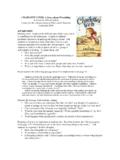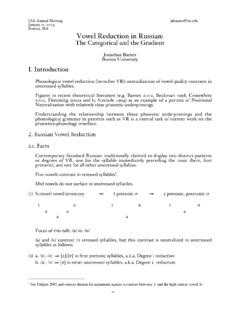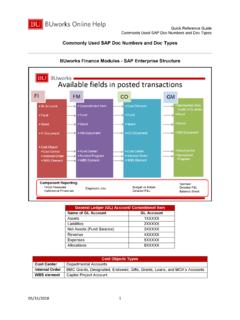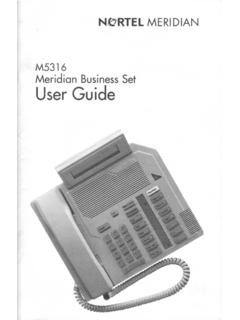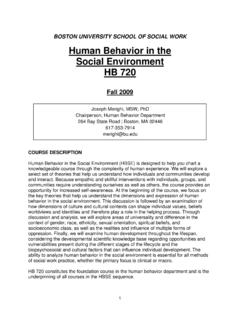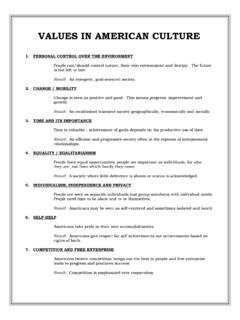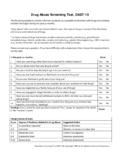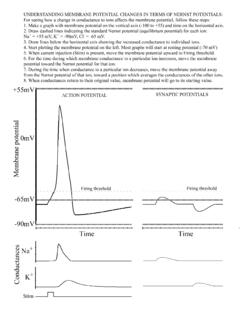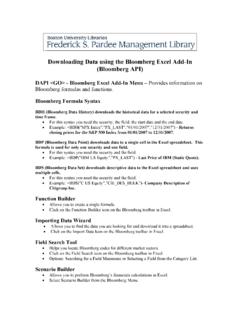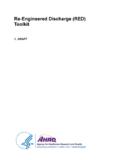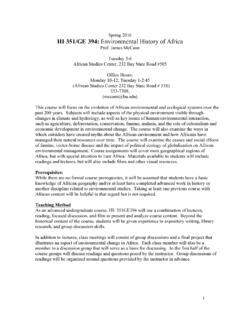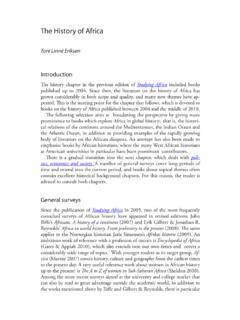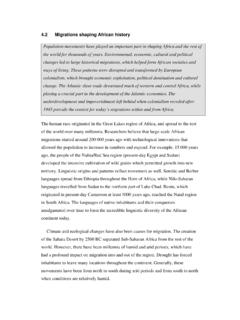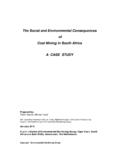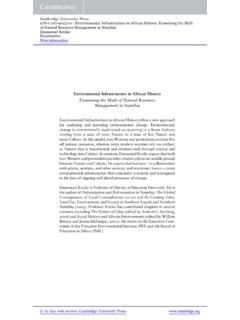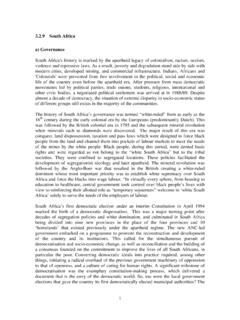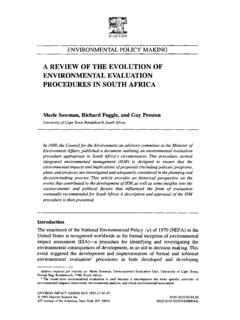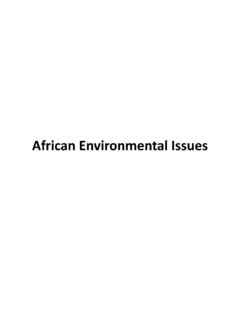Transcription of Spring 2014 HI 351/GE 394: Environmental History …
1 1 Spring 2014 HI 351/GE 394: Environmental History of africa Prof. James McCann Wednesday 1-4 African Studies Center, 232 Bay State Road #505 Office Hours: Monday 10-12; Wednesday 10-12 Office: 232 Bay State Rd. #518 353-7308 This course will focus on the evolution of African Environmental and ecological systems over the past 200 years. Subjects will include aspects of the physical environment visible through changes in climate and hydrology, as well as key issues of human/ Environmental interaction, such as agriculture, deforestation, conservation, famine, malaria, and the role of colonialism and economic development in Environmental change. The course will also examine the ways in which outsiders have created myths about the African environment and how Africans have managed their natural resources over time.
2 The course will examine the causes and social effects of famine, vector-borne disease and the impact of political ecology of globalization on African Environmental management. Course assignments will cover most geographical regions of africa , but with special attention to East africa . Materials available to students will include readings and lectures, but will also include films and other visual resources. Prerequisites: While there are no formal course prerequisites, it will be assumed that students have a basic knowledge of African geography and/or at least have completed advanced work in History or another discipline related to Environmental studies. Taking at least one previous course with African content will be helpful in that regard but is not required. Teaching Method As an advanced undergraduate course, HI/ 351GE394 will use a combination of lectures, reading, focused discussion, and film to present and analyze course content.
3 Beyond the historical content of the course, students will be given experience in expository writing, library research, and group discussion skills. In addition to lectures, class meetings will consist of group discussions and a final project that illustrates an aspect of Environmental change in africa . Each class member will also be a member in a discussion group that will serve as a basis for discussing. In the first half of the course groups will discuss readings and questions posed by the instructor. Group discussions of readings will be organized around questions provided by the instructor in advance. 2 Evaluation Grades will consist of performance on written work, participation, and group work. Written work will include at least two short (3-4 page) opinion papers that will integrate reading assignments with lecture material and group discussion.
4 Each discussion group will organize and present a joint research project in the form of a website in the final class session. Each student will write up a project research report in lieu of a final exam. That report will be due on May 10 by noon in the instructor s mailbox in the African Studies Center. Reading Students are expected to have read the week's readings in advance of the sessions for which they are assigned. The following books have been ordered from the bookstore: Kjekshus, Ecology Control and Economic Development in East African History (Athens, OH). Maddox, Giblin, and Kimambo, Custodians of the Land (Athens, OH). McCann, Green Land, Brown Land, Black Land: An Environmental History of africa (Portsmouth and Oxford). McCann, Maize and Grace: africa s Encounter with a New World Crop, 1500-2000 (Cambridge, MA, 2005).
5 Beinart and Coates, Environment and History (London). *Leach and Mearns, The Lie of the Land (Portsmouth). Out of Print but on Mugar reserve Adams and McShane, The Myth of Wild africa (Berkeley). JSTOR and Periodical Database Resources: Course readings will also include several readings from a library packet available in the Reserve Room at Mugar Library. These papers may also be downloaded from JSTOR using reference materials via the website of the Mugar library. Consult that website or the Mugar Library Reference Desk. Richard Waller, "Tsetse Fly in Western Narok, Kenya," Journal of African History , Allan Hoben, Christopher Matthews, and Robert Kaplan The New Republic (January 1985). Attendance and Class Rules Like all courses at Boston University, attendance in HI/ ge 394 is required.
6 Students who miss class because of illness should notify the instructor as soon as possible after the absence. Other absences should be reported ahead of the class to be missed. Whenever possible written notification should be provided (health center slip, note from academic advisor, etc.). Please observe university regulations against consuming food or drink during class sessions. Plagarism and Academic Honesty All students are expected to adhere to the CAS Graduate School Conduct Code. plagiarism represents not only a serious violation of academic ethics, they also represent a breach of that essential trust. I will report all such incidents to the student academic conduct committee of the College of Arts and Sciences; any violation of that code will result in a final grade of F for the course.
7 3 Class Weekly Schedule January Week 1 W 15th Pt. 1: Images and Realities of African Environment (s) Introduction: Environmental History / Environmental Stories? (Discussion groups formed) Pt. 2: africa 's Environmental systems/Group discussion of images Reading: McCann, Green Land, pp. 1-51. Maddox, Giblin, and Kimambo, Custodians of the Land, 175-99. Week 2 Images and Realities of africa s Environment January 22 africa 's Environmental systems/Group discussion of images of the African environment Film: King Solomon s Mines/Discussion Reading: Adams and McShane, The Myth of Wild africa ,1-36. Maddox, Giblin, and Kimambo, Custodians of the Land, 1-14. Week 3 Population and African Agency W 29th Sources for Environmental History Population in African History : Boserup versus Malthus Maragoli: Film and Discussion on Population, Choice, and Gender in africa (Questions distributed for group discussion) Reading: Kjekshus, Ecology Control, 1-50.
8 Maddox, et. al, Custodians, 15-65. February Week 4 W 5th Desertification: Creeping Desert, Human Hands? Film and Discussion: The Desert Doesn t Bloom Here Anymore Reading: McCann, Green Land, 55-78. Maddox, et. al., Custodians of the Land, 96-122. Leach and Mearns, Lie of the Land, Chapters 1 and 4 (on reserve). 4 Week 5 W 12th Second Nature: Film and Discussion A Tale of Two Forests: Deforestation in Ethiopia Reading: McCann, Green Land, 79-108. Week 6 W 19th (Monday schedule) Week 7 W 26th Lecture: The Serengeti: Static Narratives and Ecosystem Change Film: africa : the Serengeti and Group Analysis/Discussion Reading: Leach and Mearns, Lie of the Land, Chapter 6.. Adams and McShane, The Myth Wild africa , 37-84. March Week 8 W 5th The Atlantic World: the Columbian Circulation Big Bang in the Upper Guinea Forest: 1500-1900 Reading: Leach and Mearns, Lie of the Land, Chapter 6.
9 Adams and McShane, The Myth Wild africa , 37-84. Spring Break March 8-16 Week 9 African Environment and World Systems W 19th Maize and Grace in africa : Lecture and Group Discussion Group meetings Reading: McCann, Maize and Grace, 1-93. McCann, Green Land, 109-40 Week 10 W 26th Disease as History in africa Panzootic: Sleeping Sickness and The Rinderpest Epizootic 1889-92; Group Discussion: Disease and African Environment Control Reading (Week 10): Maddox, et. al., Custodians, 127-151. 5 Waller, "Tsetse Fly in Western Narok, Kenya," [JSTOR] Kjekshus, Ecology Control, pp. 51-79 Written Assignment Distributed (due April 2nd ). April Week 11 The Ecologies of Famine W 2nd Famine: Ethiopia s Agricultural Paradox African Famine and the Media, Film: Consuming Hunger Reading: Hoben, Matthews, and Kaplan [JSTOR].
10 Week 12 The Ecology of Famine: Three Approaches W 16th Ethiopia after the Famine, Film Oxfam: The Ox Plow Project Reading: Leach and Mearns, Lie of the Land, Chapter 11 (on reserve). McCann, A Great Agrarian Cycle? [JSTOR]. Group Assignment: Use Web to find three contemporaneous accounts of the 1984-85 Ethiopian famine for group discussion. Each student will turn in copies of the accounts they find. Week 13 W 23rd Political Ecology of the African Environment: How africa s Maize Turned White Maize and Malaria: Agroecology of Tropical Disease Reading: McCann, Maize and Grace, 94-119, 174-96. Adams and McShane, The Myth of Wild africa , 161-263. McCann, Green Land, 141-74. Film: Darwin s Nightmare Week 14 W 31th Group Reports and Review May Final Exam Due May 7th (in McCann mailbox in African Studies Center) 6 HI/ ge 394 Film Schedule and Location Date Film Campus Source Jan 22 King Solomon s Mines Krasker (Net Flix) Jan 29 Maragoli Krasker Feb 5 Desert Doesn t Bloom Outreach Feb 12 Second Nature Outreach Feb 26 Serengeti Office (McCann) March 5 Consuming Hunger Outreach April 2 Consuming Hunger April 16 Ethiopia After the Famine Outreach April 23 Darwin s Nightmare Outreach
